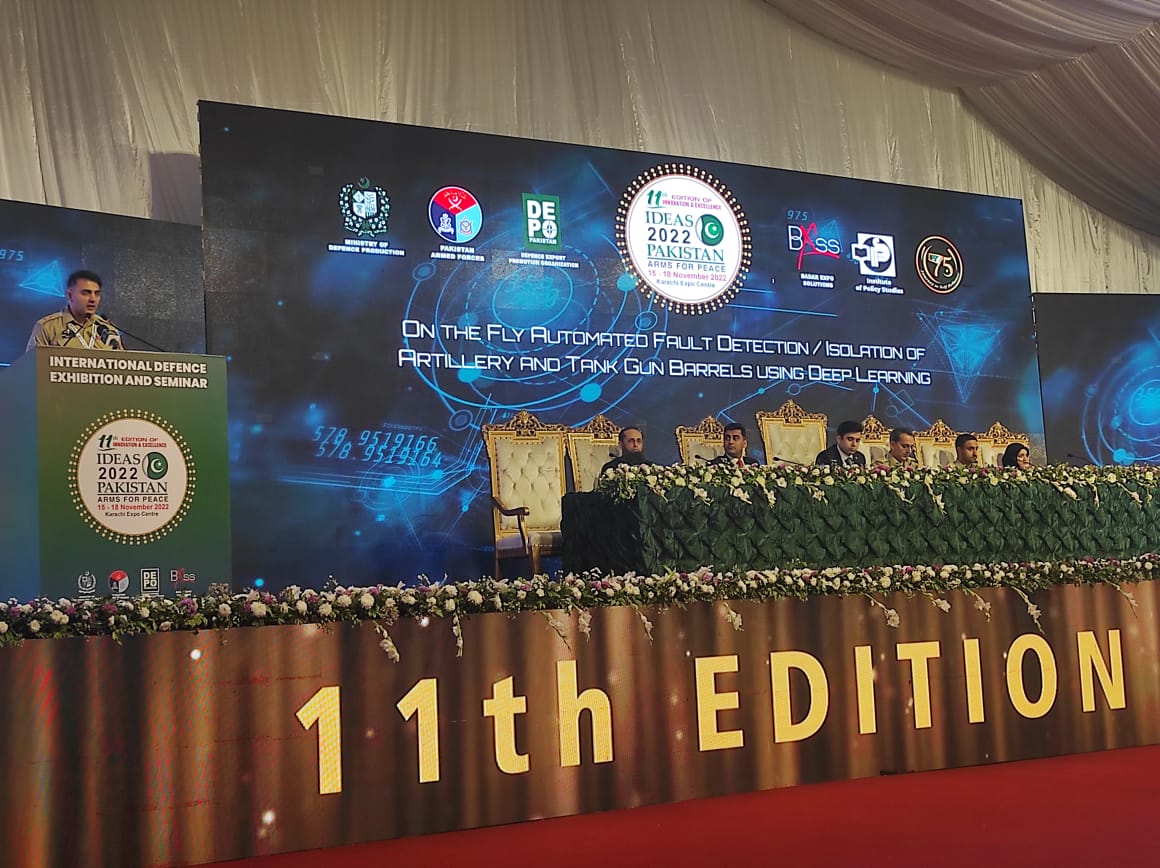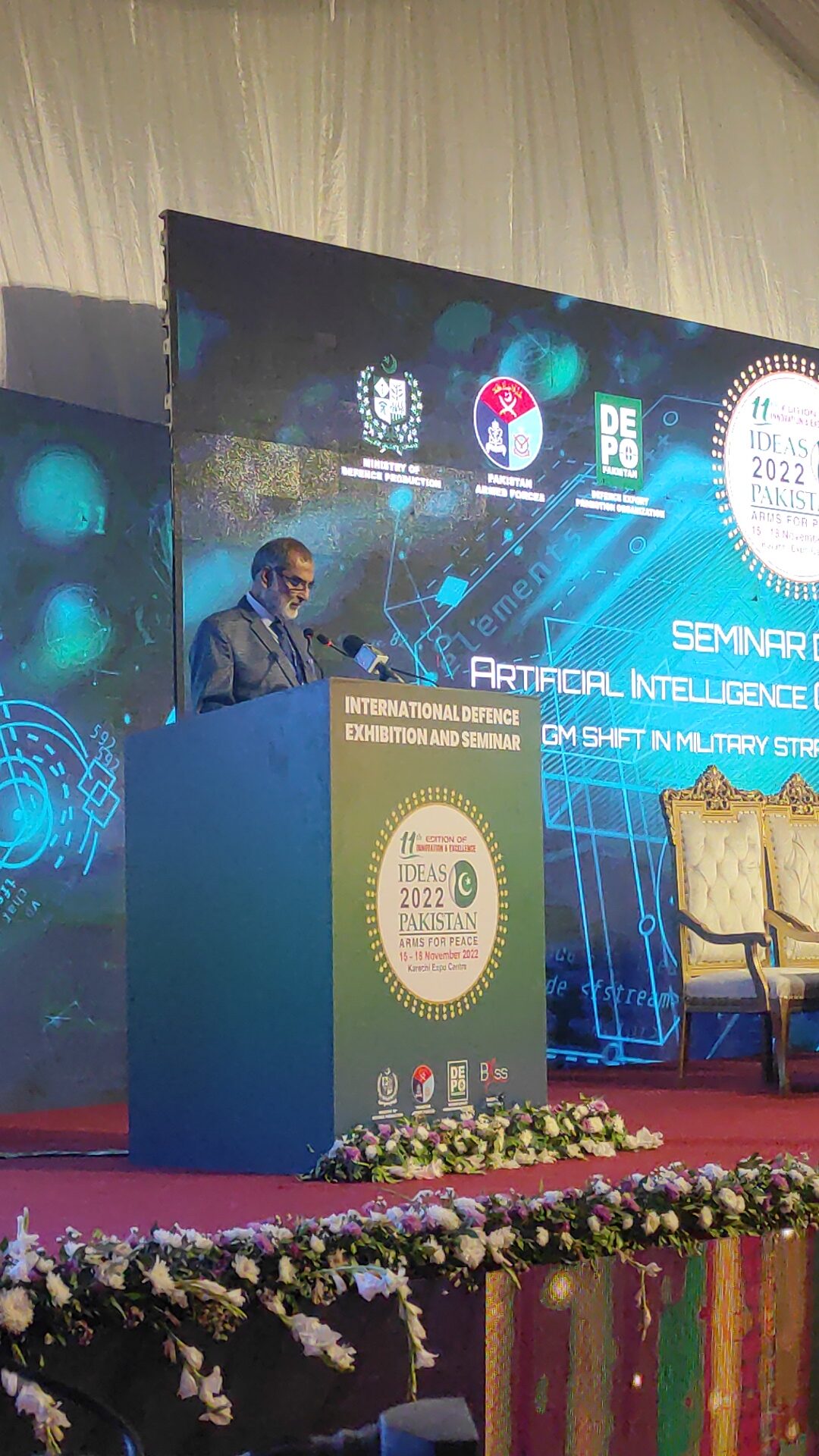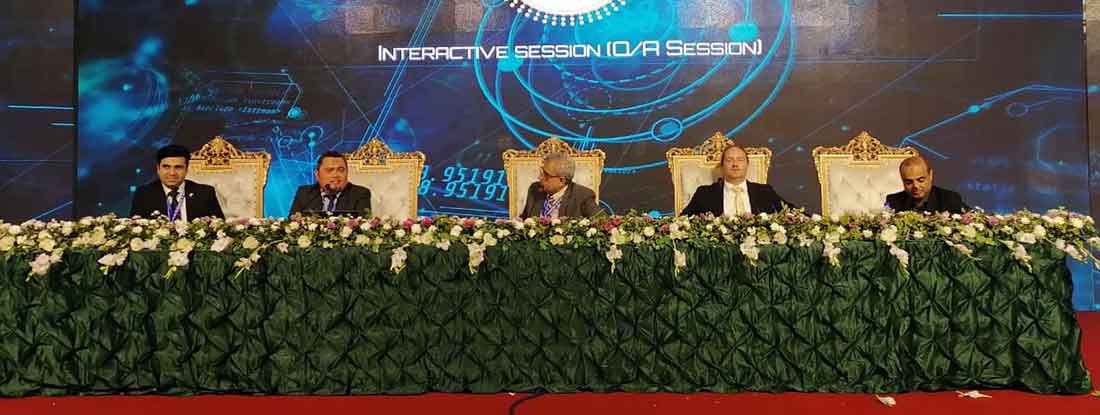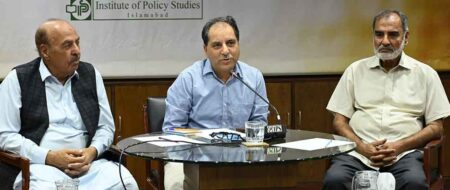‘Artificial Intelligence (AI) in Defence Market: A Paradigm Shift in Military Strategy and National Security’
IDEAS2022 seminar stresses pragmatic technology-oriented research to make Pakistan a global AI hub
The unconstrained potential in AI progress demands Pakistan to keep abreast with the advancements in AI and match its pace through research, an imperative for making Pakistan a global hub of AI, data science, Internet of Things (IoT), and others. In this regard, an essential role is played by universities, which serves as key institutions of research, creativity, collaboration, and combining expertise.
This was highlighted during the second day of a two-day seminar titled ‘Artificial Intelligence (AI) in Defence Market; A Paradigm Shift in Military Strategy and National Security’, which was organized at Expo Centre, Karachi, on November 15-16, 2022, as part of IDEAS 2022 in joint-collaboration of IPS and Defence Export Promotion Organization (DEPO).
The first day of the seminar, which was moderated by Prof Dr Syed Irfan Hyder, vice chancellor, Ziauddin University, was graced as Chief Guest by Lt Gen (Retd) Humayun Aziz, HI (M), secretary, Ministry of Defence Production, and addressed by Maj Gen Muhammad Arif Malik, HI (M), DG DEPO, Lars GA Hilse, a German scholar and global thought leader in the field of digital strategy and cyber security, Dr Sigit Jarot, CEO Cloudtech and Head of Infrastructure, MASTEL, Indonesia, Dr Yasar Ayaz, CPD/Chairman, National Center of Artificial Intelligence (NCAI), and Dr Jawwad Shamsi, dean, FAST NUCES Faculty of Computer.
The second day of the forum was attended as chief guest by Muhammad Israr Tareen, federal minister, Defence Production. Chairman IPS Khalid Rahman delivered the introductory remarks while Dr Yasar Ayaz, CPD/chairman, NCAI moderated the event. The speakers included Lt Colonel Dr Ghulam Murtaza, College of EME, NUST, Dr Muhammad Tayab Ali, NCAI, NUST, Major Aon Safdar, College of EME, NUST, Dr Waleed Bin Shahid, MCS, NUST, Lt Colonel Usman Zia, MCS, NUST, and Sqn Ldr Javeria Farooq, CAE, NUST.
Attended by various foreign dignitaries, high-rank government officials, ministries, academics, think tanks, representatives from public and private industries, and law experts, the insightful presentations delivered on both days were followed by very thought-provoking discussions by two highly proficient panels.

With Artificial Intelligence having different dimensions of application, Lt Gen (Retd) Humayun Aziz termed it as an aspirational goal, a game changer, and a transformative national security technology that is opening up several prospects of military success as well as threats to defense and security. Hence, demanding a holistic approach to better cater to prospects and curtail emerging menaces.
Speaking as a keynote speaker on the first day, he stated that three major areas of national security which would see a significant impact from the increasing developments in AI are military superiority, information superiority, and economic superiority through data, data-driven technologies, machine learning technology, network technologies, and cyber defense technology, etc.
Regarding the future dynamics of the international security environment and strategic shifts in defense, he noted that these are dependent on AI and AI-driven applications, which have now become key pillars of states. However, these developments would not curtail the significance and reliance on conventional capabilities in mitigating and combating threats.
He further maintained that the transformation of warfare through AI, along with biotech, strategic weaponry, and computers, would increase armed forces’ readiness and bring a paradigm shift in modern warfare and the security apparatus of states.
Acknowledging Pakistan’s progress in the industrial and defense sectors driven by artificial intelligence (AI) and machine learning (ML), Tareen, the chief guest of the second day, stated that the country can become a global hub for AI, data science, cloud-native computing, edge computing, blockchain, augmented reality, and internet of things (IoT) by reshaping and revolutionizing education, businesses, and research through the adoption of cutting-edge technologies and AI-driven applications.
While highlighting the role of academia, research scholars, and data-savvy individuals in development, he emphasized that the country’s talented youth should be provided opportunities in the field of AI and Fourth Industrial Revolution (Industry 4.0) through initiatives like the Presidential Initiative for Artificial Intelligence and Computing (PIAIC).
Apart from social, political, and economic changes, advanced technologies, 5G, and AI have also changed the whole dynamics of contemporary warfare, battlefields, tactics, and strategies, he underscored. With such strategic shifts, the concept of security has widened beyond conventional terms and rudimentary procedures to include sophisticated mechanisms and technology-driven procedures. These pose new challenges to the states, he added.
Highlighting the globalization of weapon systems and advancements in AI, Maj Gen Arif emphasized that new technologies have ushered increased opportunities, demands, and investments in the development of AI-integrated systems in the defense and security domain.
He advocated for building awareness for the use of AI and AI research in the fields of intelligence collection and analysis, logistics, robotics, cyber missions, information operations, C2, and autonomous weaponry for better incorporation of AI into real-world military operations globally.
Emphasizing the importance of investing in AI, he underlined that AI is changing not only the living styles, employment performances, people-to-people interaction, learning, and decision-making of people as well as the operational and business environment of organizations but also military tactics and warfare.
 Accentuating the role of human intellect and research in the process of development, Khalid Rahman highlighted that humans through research have been able to maximize knowledge, store it, make it retrievable, process it as quickly as possible, and then analyze and act upon it.
Accentuating the role of human intellect and research in the process of development, Khalid Rahman highlighted that humans through research have been able to maximize knowledge, store it, make it retrievable, process it as quickly as possible, and then analyze and act upon it.
In this regard, universities have served as the key platforms to set the pace for humanity in the key areas of society, culture, economics, and the environment and, more particularly, in the field of AI, which reflects in every other field of life.
The progress in AI would not stop and no country should stay behind in acing the AI development, he emphasized. The role in AI progress is essentially played by universities, where research, creativity, and collaboration, enabled by AI learning environment, can not only capitalize on the potentials of AI but also deal with the challenges of phenomenon by combining expertise, insights, and multiple lenses.
To meet the new complex security challenges of the 21st century, the speakers presented their research papers, ideas, and findings on different AI-driven applications and processes, upon which depend the future international security dynamics.
Significant capitalization of AI has been seen in hybrid, cyber, and network-centric warfare. As put by Lars Hilse, the current AI applications in hybrid warfare through fake news, misinformation, disinformation, cyber-physical attacks on civilian infrastructure, opinion manipulation, and adversarial reconnaissance and intelligence gathering triggers civil unrest and have serious security and economic implications.
Similar is the case with the use of AI in cyber security which demands a defense approach and practical steps towards a robust security framework based on identification and prioritization of critical infrastructure, efficient legislature, regular stress and penetration tests, continuous vulnerability testing (CVT), and multi-layered neural networks, he outlined.
5G Network Centric Warfare (NCW), as underlined by Sigit Jarot, is increasingly becoming relevant as information and AI-driven technologies are employed to gain information advantage to convert it to a competitive advantage.
He further noted that future battles would entail the weaponization of 5G; therefore, it calls for an approach to study and develop 5G for future military endeavors including 5G military decision-making, 5G smart warehousing, 5G distributed C2, 5G AR/VR, 5G for tactical millimeter wave networks, 5G non-terrestrial networks, proximity services (ProSe), and 5G geo-intelligence.
Apart from these applications, 5G is also going to make a mark in the defense market so much so that it is expected to reach $76, 014.64 million by 2030 with a compound annual growth rate of 67.7% (2021-2030).
Dr Ghulam Murtaza presented his study on automated fault detection/isolation of artillery and tank gun barrels using deep learning and advocated for robotic inspections as a cheap and more accurate alternative to manual examination.
Dr Tayab Ali highlighted the threats of the dissemination of misinformation and misrepresentation and the need to devise AI-powered tools and mechanisms, such as smart media monitoring and analytics system, to enhance the defense capabilities and face the challenges of the 5th generation warfare.
Major Aon Safdar showed how accurate real-time automatic target detection and recognition (ATR) from thermal infrared imagery is a challenging computer vision task and proposed a model called YOLOatr, a modified anchor-based single-stage detector, to attain up to 99.6% ATR performance.
hile presenting his research, Dr Waleed Bin Shahid pointed out the surge in web application attacks, calling for deep learning based-approaches and frameworks. He also presented an AI-based attack detection framework based on Static Application Security Testing Technique (SAST) output.
Usman Zia highlighted the advantages of transforming remote sensing images to textual descriptions. He proposed a model that can enhance information exchange between the frontline and command center and effectiveness in remote sensing image retrieval (RSIR) and image analysis.
Pointing out the performance degradation of object detectors caused by unseen data, Javeria Farooq proposed a two-step approach to improve the generalization of the domain randomization model for low-resolution 2D datasets for the detection of foreign object debris. Retraining the model improved detection accuracy to 92%, she highlighted.













Comment (1)
To Keep pace with upcoming Challenges media monitoring in terms of facts and figures is so important.
Avoiding archive practices ,improficiency scamp and spam free measures are need of the hour.
Retraining of “middlers “aging 40 to 50 may add value to the projects.
Comments are closed.